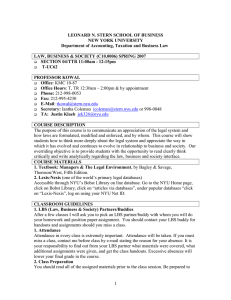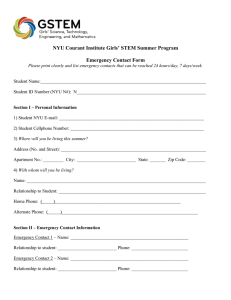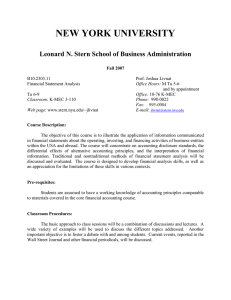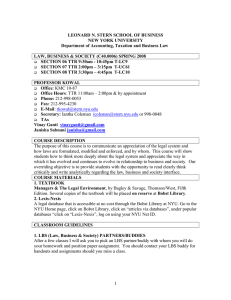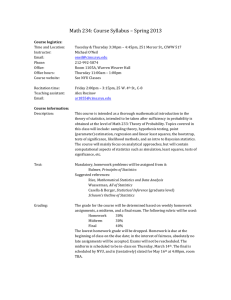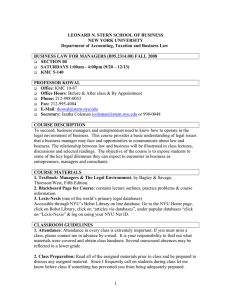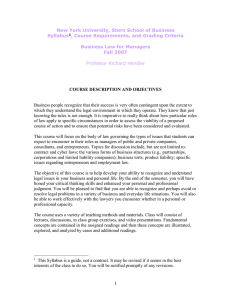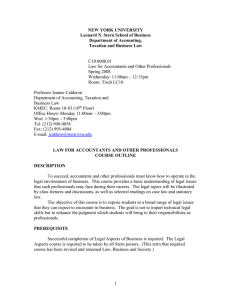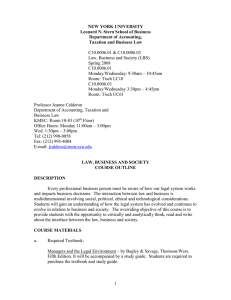LEONARD N. STERN SCHOOL OF BUSINESS NEW YORK UNIVERSITY
advertisement
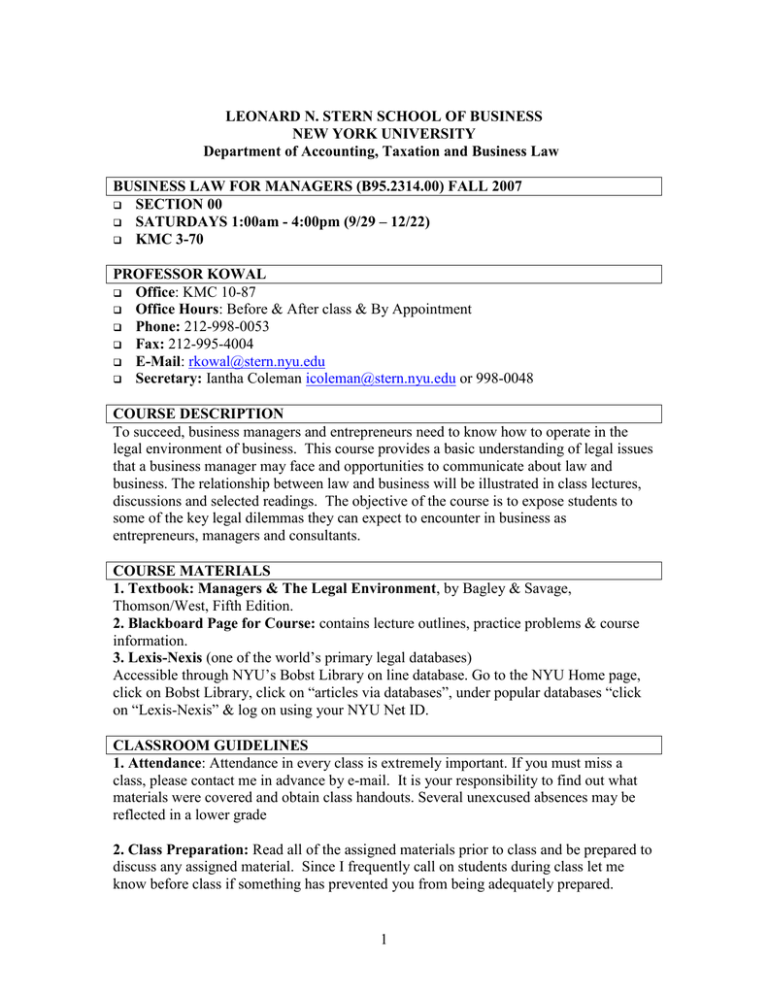
LEONARD N. STERN SCHOOL OF BUSINESS NEW YORK UNIVERSITY Department of Accounting, Taxation and Business Law BUSINESS LAW FOR MANAGERS (B95.2314.00) FALL 2007 SECTION 00 SATURDAYS 1:00am - 4:00pm (9/29 – 12/22) KMC 3-70 PROFESSOR KOWAL Office: KMC 10-87 Office Hours: Before & After class & By Appointment Phone: 212-998-0053 Fax: 212-995-4004 E-Mail: rkowal@stern.nyu.edu Secretary: Iantha Coleman icoleman@stern.nyu.edu or 998-0048 COURSE DESCRIPTION To succeed, business managers and entrepreneurs need to know how to operate in the legal environment of business. This course provides a basic understanding of legal issues that a business manager may face and opportunities to communicate about law and business. The relationship between law and business will be illustrated in class lectures, discussions and selected readings. The objective of the course is to expose students to some of the key legal dilemmas they can expect to encounter in business as entrepreneurs, managers and consultants. COURSE MATERIALS 1. Textbook: Managers & The Legal Environment, by Bagley & Savage, Thomson/West, Fifth Edition. 2. Blackboard Page for Course: contains lecture outlines, practice problems & course information. 3. Lexis-Nexis (one of the world’s primary legal databases) Accessible through NYU’s Bobst Library on line database. Go to the NYU Home page, click on Bobst Library, click on “articles via databases”, under popular databases “click on “Lexis-Nexis” & log on using your NYU Net ID. CLASSROOM GUIDELINES 1. Attendance: Attendance in every class is extremely important. If you must miss a class, please contact me in advance by e-mail. It is your responsibility to find out what materials were covered and obtain class handouts. Several unexcused absences may be reflected in a lower grade 2. Class Preparation: Read all of the assigned materials prior to class and be prepared to discuss any assigned material. Since I frequently call on students during class let me know before class if something has prevented you from being adequately prepared. 1 3. Seating: Since class participation is important I will try to learn your names quickly Bring your nameplate to each class to help me learn your name. Please correct me if I mispronounce your name. 4. Classroom Participation: This course requires classroom participation. I am aware that some of you may be shy about speaking out in the classroom. I respect this but strongly encourage you to participate. 5. Examinations: The midterm and final examinations will be non-cumulative and open notes (your notes & my lecture outlines). The exams will include material covered in the textbook, handouts and class sessions. A make-up exam is possible if I am notified prior to the scheduled examination and appropriate documentation is provided. Students who may need special consideration because of disability should see me during office hours early in the semester. 6. Policy on Academic Dishonesty Students in this class should only submit work that is their own work. Academic dishonesty can take many forms such as copying the work of another and submitting it as your own work, failing to attribute credit to a reference source, allowing another to copy your work and copying from another during an exam. Academic dishonesty undermines the school's code of conduct and is unfair to other students. Instances of academic dishonesty will be referred to the appropriate venue. COURSE ASSIGNMENTS & GRADING The final grade for the course will be approximately based on the course assignments: ASSIGNMENTS GRADE FORMAT DUE DATE PERCENTAGE 25% Multiple choice November 3 Midterm Open notes 25% Multiple choice December 22 Final Exam Open notes Non-cumulative 30% 5 page paper December 23 Position Paper 20% 10 minute in class TBD News Report presentation POSITION PAPER ASSIGNMENT Due any time during the course but no later than December 23rd Paper Topics Choose a current legal controversy or issue that interests you from one of the course topics. Picking a “fruitful” topic and framing the specific legal issue(s) is the key to writing a successful paper. If you need help finding a paper topic or formulating your ideas feel free to contact me. 2 Paper Requirements 1. Due any time during the course but no later than 12/23. 2. Where? Posted on Blackboard by Midnight on 12/23 2. Typed & Double spaced & Bibliography 3. Five page limit 4. Outside research: include at least 4 outside sources one of which should be an original legal source (case or law). Organization of Paper Introduction Briefly describe the legal issue, topic or case that your paper concerns Facts Provide background information about the legal issue, topic or case. Analysis Analyze the various sides/aspects of the legal situation. Conclusion/Position State your overall conclusion and include your position/views regarding your paper topic. Bibliography List of all references used. Footnotes As needed Research The "Facts" and "Analysis" sections of your paper will require some outside research. Use at least 3 new outside sources (besides the textbook) and ONE of these outside sources must be an ORIGINAL legal source, i.e. a court decision, case or statute/law. Other outside sources can be periodicals, newspapers, Internet sites, etc. Justin can be a big help in directing you to outside original legal resources and helping you with your paper topic choices. For research I would recommend that you begin with Findlaw.com and Lexis.nexis (available to NYU students via Bobst Library online databases). If you have any questions please email Prof. Kowal. NEWS REPORT ASSIGNMENT Students will present 10-minute news reports on current legal events that are relevant to the course. Students may use any media they wish to present, i.e. Power point, handouts, video clips, etc. Sign ups for the news reports will be on the first day of class. You will be working with a student from the class. You may choose who you wish to work with. News Report Requirements 1. Choose a current business law event that has taken place in the past 6 months and present it to the class. 2. 10 minute classroom presentation 2. Include in your presentation how your topic is relevant to our study of law & business 3. Elicit a classroom discussion. 3 COURSE SCHEDULE The schedule set forth below is subject to change as the need arises. All changes will be announced in class & on Blackboard. If you miss a lecture it is your responsibility to find out about any announced changes. All chapters are in the Managers and the Legal Environment textbook. Courts with Integrity & Individual Rights Sept. 29 October 27 Courts, Sources of Law and Litigation Constitutional Bases for Business Regulation Contracts Contracts The Employment Agreement & Employment Discrimination Torts & Product Liability Business Rights & Fiduciary Duty November 3 MIDTERM EXAM October 6 October 13 October 20 Business Rights & Fiduciary Duty November 10 Chapter 3 & 2 Chapter 7 & 8 Chapter 7 & 8 (cont’d) Chapter 12 & 13 Chapter 9 & 10 Agency Intellectual Property Forms of Business Directors, Officers & Controlling Shareholders Chapter 5 Chapter 11 Chapter 19 Chapter 20 Omit pp. 758-776 THANKSGIVING No Class Chapter 23 Chapter 14 December 15 Securities Fraud & Insider Trading Criminal Law Debtor-Creditor Relations & Bankruptcy No Class December 22 FINAL EXAM November 17 November 24 Financial Transactions December 1 December 8 4 Chapter 24 NOTE: 6 class sessions (TBD) will end at 4:30 instead of 4:00pm to make-up this class session.
